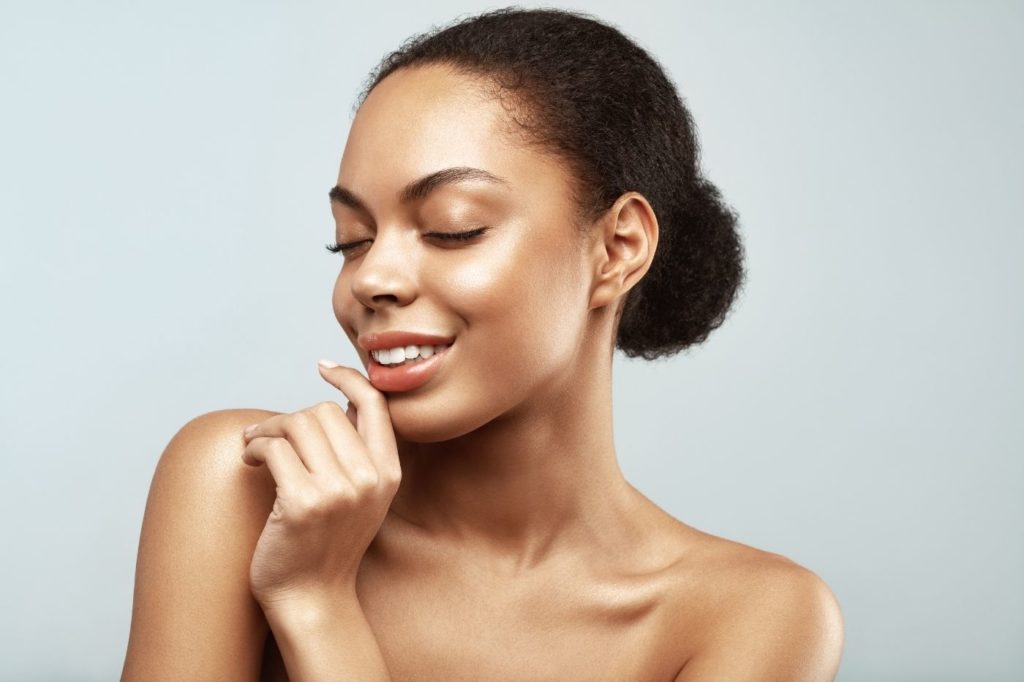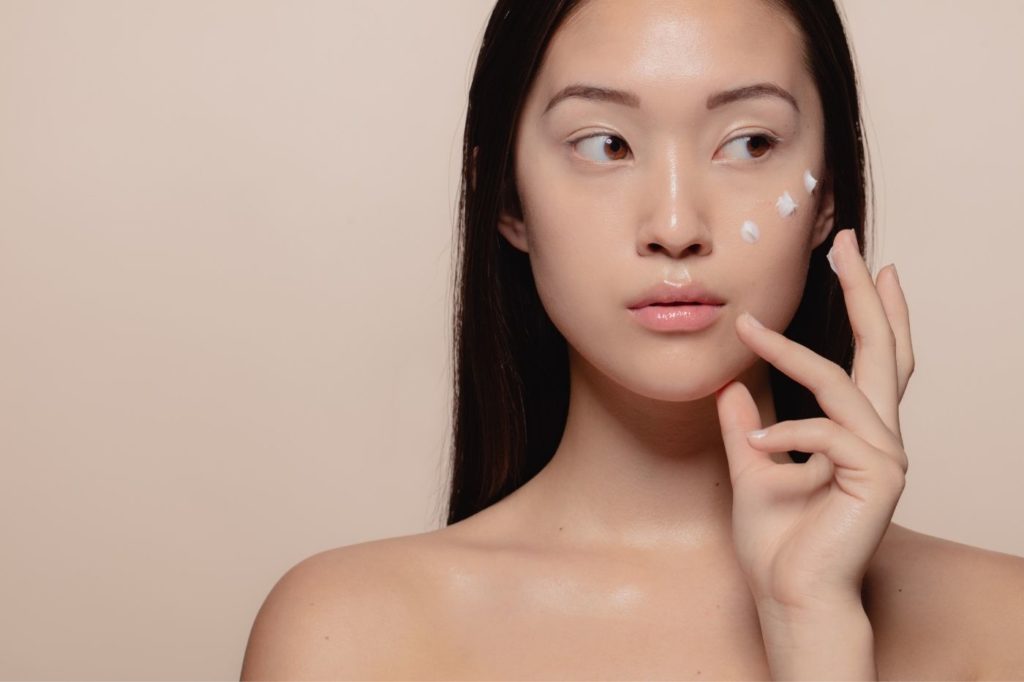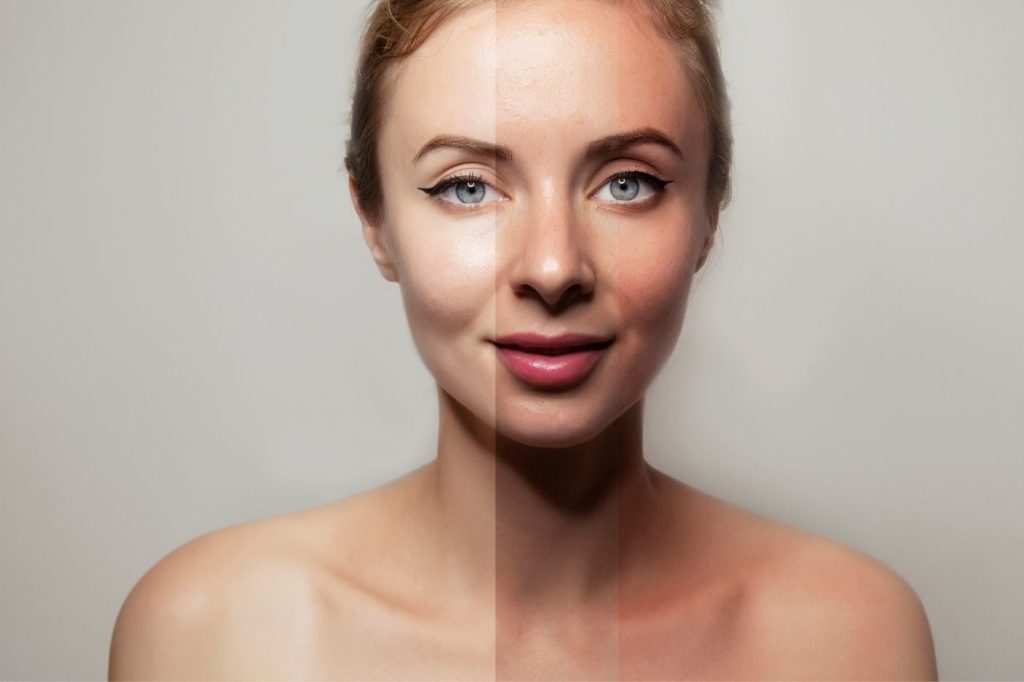In my dermatology research, I’m always looking for what’s coming up in skincare. After all, you deserve the best!
Melatonin is one product making quite a buzz, promising to protect against free radicals and signs of aging.
But is it actually effective, or just the latest trend?
Here’s what you need to know about melatonin for the skin.
What is Melatonin?
Melatonin is a hormone produced in the pineal gland of your brain, which is part of your endocrine system. It is naturally secreted by your body in response to darkness and can dictate to your brain when it’s time to sleep.
Melatonin’s effects have been most studied on sleep and circadian rhythms (your body’s internal clock). The change to darkness outside triggers melatonin production, which binds to your melatonin receptors and starts signaling to the body that it’s time to sleep.
Your skin even has its own circadian rhythm, dictating when new skin cells are formed. The hormone melatonin plays a significant role in these patterns for both your skin and body.
Several factors can affect your body’s production of melatonin, including:
- Exposure to bright light after dark
- Smoking
- Aging
- Lack of exposure to natural light or overexposure to blue light
- Sleep deprivation
- And a skin factor I am always mentioning: stress
It’s essential to care for your body by living as health stress-free as possible, but sometimes, life gets overwhelming. I’ve written about coping with stress in detail here, and melatonin — with a holistic skincare regimen — may be a great topical option to combat stress’ effects on the skin.
How does melatonin help your skin?
Evidence suggests melatonin may help not only your skin’s natural circadian rhythm but maybe even act as a powerful anti-aging and antioxidant agent. It can reduce UV damage to the skin and even improve hyperpigmentation.
Melatonin can act like the Night’s Watch from Game of Thrones, looking out for and repairing damage to your skin as you sleep. The skin usually does its best repair and restoration work overnight, and melatonin may speed up that process.
Is there melatonin in your skin? Yes, there is already some melatonin in your skin. However, it may be helpful to supplement topical melatonin for your skin, especially as you grow older.
While our bodies naturally produce this hormone, our pineal gland’s secretion of melatonin naturally decreases as we age. We may want to supplement what our skin is getting, particularly as the years go on.
There are a few questions surrounding the use of melatonin. Does melatonin darken skin? Melatonin does not darken skin, according to scientific studies.
Another question that is commonly asked on the internet: what is melatonin skin color? Melatonin skin color doesn’t exist.
It seems that people mix up the term melanin, the pigment your skin produces that determines its color, with melatonin, a hormone made in the body that regulates sleep.
Melatonin as a dietary supplement has relatively few, minor side effects that are generally rare, like:
- Drowsiness
- Dizziness
- Nausea
- Headache
You may also be wondering if applying topical melatonin on the skin’s surface will cause cognitive issues or sedative effects. The science shows that neither of these are a concern when using melatonin in your skincare.
4 Potential Benefits of Melatonin for Your Skin
The benefits of melatonin for your skin are varied and may be especially helpful if you spend time in the sun or around environmental pollutants or are starting to notice signs of aging.
Though these results are promising, very little research has been conducted to determine how melatonin impacts skin health for the average person. Because melatonin causes few to no side effects, it may be helpful to add to your skincare routine — but there’s a long way to go until we understand how effective these potential benefits are.
Note: Some of the studies and benefits referenced below refer to topical melatonin (applied to the skin), while others refer to oral melatonin (in capsule form) or the general interactions of melatonin with skin health.
1. Anti-Aging
There’s compelling evidence that adding melatonin to your skincare routine may lessen the signs of skin aging. As mentioned, our melatonin levels drop as we mature.
Melatonin has the potential to heal cell damage, even while you sleep. Its anti-inflammatory properties may also reduce inflammation, a common side effect of stress that can cause premature aging signs like lowered collagen and elastin over time.
With reduced cell damage, you’re safer from dark spots, DNA damage, and collagen breakdown that this destruction may cause. That means fewer broken blood vessels, wrinkles, fine lines, dullness, dryness, and other visible signs of aging.
No clinical trials to date have shown whether or not topical or oral melatonin will visibly reduce the signs of aging (although one animal study suggests anti-aging benefits of melatonin for age-related bone loss).
2. Restores Skin from Free Radical Damage
As melatonin connects with your skin, it activates the synthesis of antioxidant enzymes. These enzymes are known for blocking free radicals and repairing the oxidative damage to your skin.
In fact, melatonin has been called a “free radical scavenger,” and one melatonin molecule can take out up to four reactive species of free radicals. Oral melatonin may reduce the oxidative stress on your skin by signaling to create new antioxidant enzymes and scavenging for free radicals.
A 2008 review discussed the potential benefits for melatonin as a beneficial “skin protectant” for its antioxidant qualities. As with much of this research, it’s not clear yet the level to which topical or oral melatonin may improve DNA damage to skin cells.
3. Reduces Sun Damage
As we know, the ultraviolet rays of the sun can wreak havoc on our cutaneous membrane (skin).
Were you aware, though, that sun damage can continue happening during the night? Skin cells called melanocytes can continue to accumulate DNA damage up to 3 hours after light exposure.
Dermato-Endocrinology states that the effects of melatonin are known for directly counteracting the DNA damage, mitochondrial damage, and oxidative damage that UV radiation can wreak on your skin. Topically applying melatonin can also help prevent temporary redness caused by sun exposure, along with your daily SPF.
Even in cases of skin cancer, both in vivo and in vitro studies demonstrate that melatonin might be helpful as an adjuvant treatment for some melanoma cases, although this has only been studied in a lab (not human or animal clinical trials).
UV/sun damage may be prevented or slowed when proper protection is paired with melatonin. Combined with vitamins C and E, topical melatonin applied before sun exposure increased “photoprotection” (sun-blocking effects) in a small clinical trial.
4. Improves Hyperpigmentation
Many people worry about discoloring their skin with melatonin, but it can have quite the opposite result. One commonly asked question that comes across my office: Does melatonin affect skin tone? Yes, melatonin can positively affect skin tone.
Melatonin has shown promise as a possible solution to hyperpigmentation, or what you may call a dark spot. Studies have shown that melatonin may lighten these areas of unwanted pigmentation by encouraging local melatonin production in certain areas of the skin.
However, some research on this topic is inconsistent. A 2018 review suggests that research on applying topical melatonin at certain points in the circadian rhythm “is warranted” for studying the effects of melatonin on skin pigmentation.
How to Use Melatonin in Skincare
Now that you’ve read about the myriad of benefits melatonin has for your skin, you’re probably asking how to use it? Well, that depends on what results you’re seeking. Here’s how to use melatonin in skin care for optimal results at any time of day.
During the Day
During the day, you’ll want to harness the sunburn-defying, UV-defending, pigment-evening properties of melatonin. Before you leave in the morning, try topical melatonin along with your daily sunscreen application to block those harmful UV rays.
It can also be great to pair with a vitamin C cream or serum, doubling up on the antioxidant properties.
During the Night
At night, topical melatonin can complement your body’s natural production to prepare your skin for the coming day: boosting antioxidant production, preventing ongoing skin damage, and repairing the damage that occurred throughout the day.
Since melatonin is a tiny molecule, and since your skin is more permeable at night, this is an ideal time to slather on some melatonin to repair damage from the day before and reduce your risk for the morning ahead.
Try a melatonin night serum along with retinol to see great anti-aging results.
Should you use melatonin for your skin?
As always, you should consult with your dermatologist when changing up your skincare products, particularly if you are pregnant.
I wouldn’t recommend using melatonin as your only standalone skincare product, but melatonin should be a safe and effective addition to your daily or nightly skincare routine. You may notice decreased signs of aging, less sun damage, the benefits of antioxidants, and even a more even skin tone.
It’s safe to say: You don’t want to snooze on trying melatonin for your skin!
Sources
- Colten, H. R., & Altevogt, B. M. (2006). Extent and health consequences of chronic sleep loss and sleep disorders. Sleep disorders and sleep deprivation: an unmet public health problem, 55-135. Full text: https://www.ncbi.nlm.nih.gov/books/NBK19961/
- Emet, M., Ozcan, H., Ozel, L., Yayla, M., Halici, Z., & Hacimuftuoglu, A. (2016). A review of melatonin, its receptors and drugs. The Eurasian journal of medicine, 48(2), 135. Full text: https://www.ncbi.nlm.nih.gov/pmc/articles/PMC4970552/
- Ozguner, F., Koyu, A., & Cesur, G. (2005). Active smoking causes oxidative stress and decreases blood melatonin levels. Toxicology and Industrial Health, 21(10), 21-26. Abstract: https://pubmed.ncbi.nlm.nih.gov/15986573/
- Hardeland, R. (2012). Neurobiology, pathophysiology, and treatment of melatonin deficiency and dysfunction. The Scientific World Journal, 2012. Full text: https://www.ncbi.nlm.nih.gov/pmc/articles/PMC3354573/
- Harb, F., Hidalgo, M. P., & Martau, B. (2015). Lack of exposure to natural light in the workspace is associated with physiological, sleep and depressive symptoms. Chronobiology international, 32(3), 368-375. Abstract: https://pubmed.ncbi.nlm.nih.gov/25424517/
- Ito, Y., Iida, T., Yamamura, Y., Teramura, M., Nakagami, Y., Kawai, K., … & Teradaira, R. (2013). Relationships between salivary melatonin levels, quality of sleep, and stress in young Japanese females. International Journal of Tryptophan Research, 6, IJTR-S11760. Full text: https://www.ncbi.nlm.nih.gov/pmc/articles/PMC3798296/
- McElhinney, D. B., Hoffman, S. J., Robinson, W. A., & Ferguson, J. A. N. (1994). Effect of melatonin on human skin color. Journal of investigative dermatology, 102(2), 258-259. Full text: https://pubmed.ncbi.nlm.nih.gov/8106756/
- Scheuer, C., Pommergaard, H. C., Rosenberg, J., & Gögenur, I. (2016). Effect of topical application of melatonin cream 12.5% on cognitive parameters: A randomized, placebo-controlled, double-blind crossover study in healthy volunteers. Journal of Dermatological Treatment, 27(6), 488-494. Abstract: https://pubmed.ncbi.nlm.nih.gov/27052036/
- Reiter, R. J., Calvo, J. R., Karbownik, M., Qi, W., & Tan, D. X. (2000). Melatonin and its relation to the immune system and inflammation. Annals of the New York Academy of Sciences, 917(1), 376-386. Abstract: https://pubmed.ncbi.nlm.nih.gov/11268363/
- Tresguerres, I. F., Tamimi, F., Eimar, H., Barralet, J. E., Prieto, S., Torres, J., … & Tresguerres, J. A. (2014). Melatonin dietary supplement as an anti-aging therapy for age-related bone loss. Rejuvenation research, 17(4), 341-346. Abstract: https://pubmed.ncbi.nlm.nih.gov/24617902/
- Fischer, T. W., Slominski, A., Zmijewski, M. A., Reiter, R. J., & Paus, R. (2008). Melatonin as a major skin protectant: from free radical scavenging to DNA damage repair. Experimental dermatology, 17(9), 713-730. Abstract: https://pubmed.ncbi.nlm.nih.gov/18643846/
- Tan, D. X., Reiter, R. J., Manchester, L. C., Yan, M. T., El-Sawi, M., Sainz, R. M., … & Hardeland, R. (2002). Chemical and physical properties and potential mechanisms: melatonin as a broad spectrum antioxidant and free radical scavenger. Current topics in medicinal chemistry, 2(2), 181-197. Abstract: https://pubmed.ncbi.nlm.nih.gov/11899100/
- Premi, S., Wallisch, S., Mano, C. M., Weiner, A. B., Bacchiocchi, A., Wakamatsu, K., … & Brash, D. E. (2015). Chemiexcitation of melanin derivatives induces DNA photoproducts long after UV exposure. Science, 347(6224), 842-847. Abstract: https://pubmed.ncbi.nlm.nih.gov/25700512/
- Kleszczynski, K., & Fischer, T. W. (2012). Melatonin and human skin aging. Dermato-endocrinology, 4(3), 245-252. Full text: https://www.ncbi.nlm.nih.gov/pmc/articles/PMC3583885/
- Scheuer, C., Pommergaard, H. C., Rosenberg, J., & Gögenur, I. (2016). Dose dependent sun protective effect of topical melatonin: A randomized, placebo-controlled, double-blind study. Journal of dermatological science, 84(2), 178-185. Abstract: https://pubmed.ncbi.nlm.nih.gov/27543364/
- Izykowska, I., Gebarowska, E., Cegielski, M., Podhorska-Okolow, M., Piotrowska, A., Zabel, M., & Dziegiel, P. (2009). Effect of melatonin on melanoma cells subjected to UVA and UVB radiation in In vitro studies. In Vivo, 23(5), 733-738. Abstract: https://pubmed.ncbi.nlm.nih.gov/19779108/
- Slominski, A. T., Hardeland, R., Zmijewski, M. A., Slominski, R. M., Reiter, R. J., & Paus, R. (2018). Melatonin: a cutaneous perspective on its production, metabolism, and functions. Journal of Investigative Dermatology, 138(3), 490-499. Full text: https://www.ncbi.nlm.nih.gov/pmc/articles/PMC5828910/
- Matsui, M. S., Pelle, E., Dong, K., & Pernodet, N. (2016). Biological rhythms in the skin. International journal of molecular sciences, 17(6), 801. Full text: https://www.ncbi.nlm.nih.gov/pmc/articles/PMC4926335/




